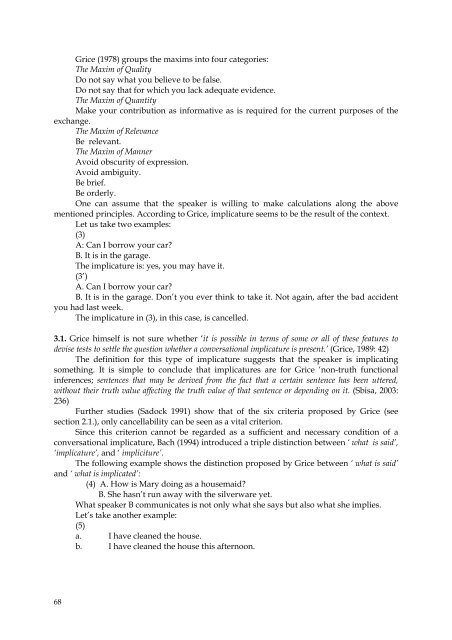Vol. 5/2009 - Facultatea de Litere
Vol. 5/2009 - Facultatea de Litere
Vol. 5/2009 - Facultatea de Litere
Create successful ePaper yourself
Turn your PDF publications into a flip-book with our unique Google optimized e-Paper software.
Grice (1978) groups the maxims into four categories:<br />
The Maxim of Quality<br />
Do not say what you believe to be false.<br />
Do not say that for which you lack a<strong>de</strong>quate evi<strong>de</strong>nce.<br />
The Maxim of Quantity<br />
Make your contribution as informative as is required for the current purposes of the<br />
exchange.<br />
The Maxim of Relevance<br />
Be relevant.<br />
The Maxim of Manner<br />
Avoid obscurity of expression.<br />
Avoid ambiguity.<br />
Be brief.<br />
Be or<strong>de</strong>rly.<br />
One can assume that the speaker is willing to make calculations along the above<br />
mentioned principles. According to Grice, implicature seems to be the result of the context.<br />
Let us take two examples:<br />
(3)<br />
A: Can I borrow your car?<br />
B. It is in the garage.<br />
The implicature is: yes, you may have it.<br />
(3’)<br />
A. Can I borrow your car?<br />
B. It is in the garage. Don’t you ever think to take it. Not again, after the bad acci<strong>de</strong>nt<br />
you had last week.<br />
The implicature in (3), in this case, is cancelled.<br />
3.1. Grice himself is not sure whether ‘it is possible in terms of some or all of these features to<br />
<strong>de</strong>vise tests to settle the question whether a conversational implicature is present.’ (Grice, 1989: 42)<br />
The <strong>de</strong>finition for this type of implicature suggests that the speaker is implicating<br />
something. It is simple to conclu<strong>de</strong> that implicatures are for Grice ‘non-truth functional<br />
inferences; sentences that may be <strong>de</strong>rived from the fact that a certain sentence has been uttered,<br />
without their truth value affecting the truth value of that sentence or <strong>de</strong>pending on it. (Sbisa, 2003:<br />
236)<br />
Further studies (Sadock 1991) show that of the six criteria proposed by Grice (see<br />
section 2.1.), only cancellability can be seen as a vital criterion.<br />
Since this criterion cannot be regar<strong>de</strong>d as a sufficient and necessary condition of a<br />
conversational implicature, Bach (1994) introduced a triple distinction between ‘ what is said’,<br />
‘implicature’, and ‘ impliciture’.<br />
The following example shows the distinction proposed by Grice between ‘ what is said’<br />
and ‘ what is implicated’:<br />
(4) A. How is Mary doing as a housemaid?<br />
B. She hasn’t run away with the silverware yet.<br />
What speaker B communicates is not only what she says but also what she implies.<br />
Let’s take another example:<br />
(5)<br />
a. I have cleaned the house.<br />
b. I have cleaned the house this afternoon.<br />
68












